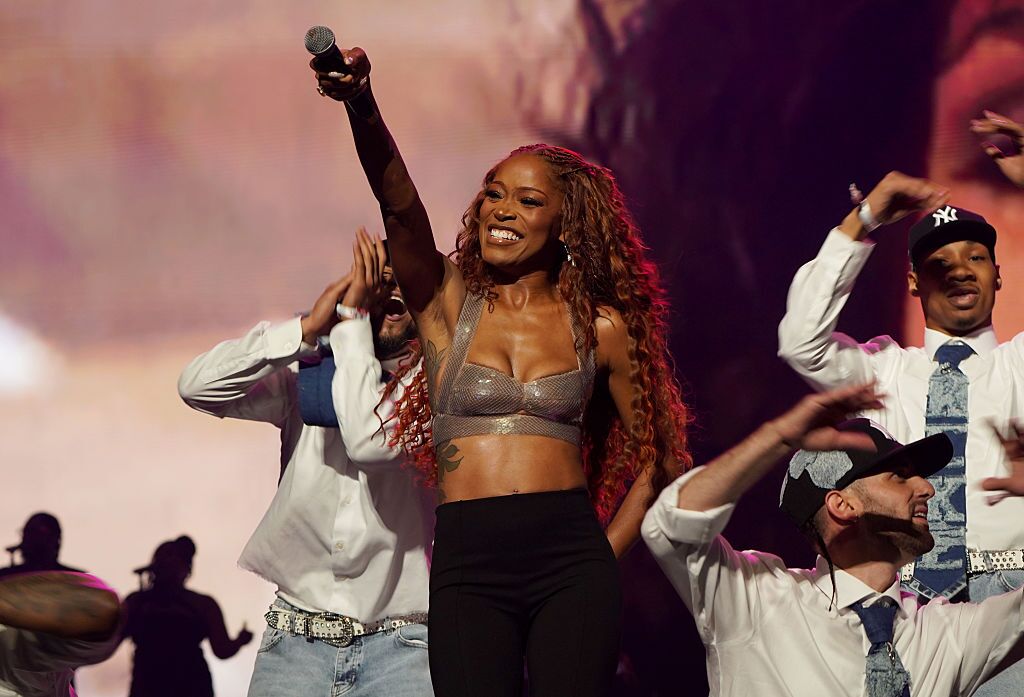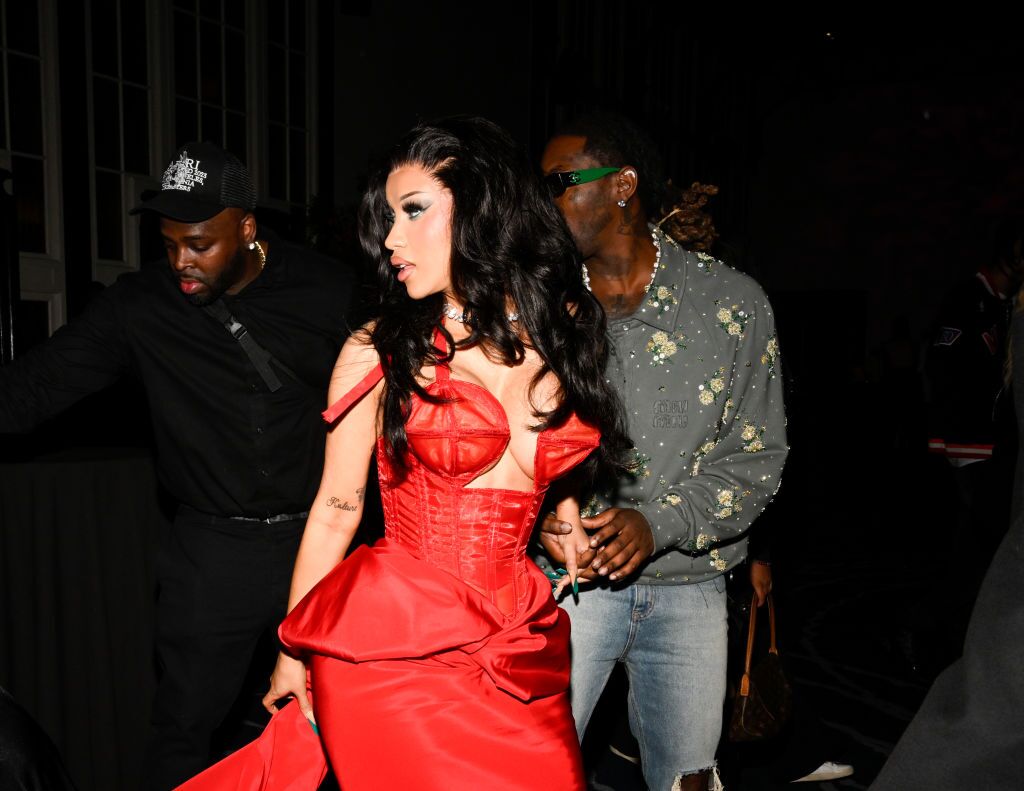From Halle Bailey to Keke Palmer and Skai Jackson, Black women’s stories of resilience and survival show that strength comes from community, not a wedding ring.
This essay is part of an ongoing Gender & Democracy series, presented in partnership with Groundswell Fund and Groundswell Action Fund, highlighting the work of Groundswell partners advancing inclusive democracy. You’ll find stories, reflections and accomplishments—told in their own words—by grassroots leaders, women of color, Indigenous women, and trans and gender-expansive people supported by Groundswell. By amplifying these voices—their solutions, communities, challenges and victories—our shared goal is to show how intersectional organizing strengthens democracy.
When news broke that Halle Bailey had filed for a restraining order against her child’s father, DDG, my side of the internet didn’t erupt in shock. Instead, it sighed.
Bailey, who I’ve been a fan of since the YouTube cover days, is widely known for her breakout role in The Little Mermaid live-action movie and her position as one-half of the Grammy-nominated duo Chloe x Halle. She spent the better part of her 2023 pregnancy in privacy, going so far as to deny the swirling rumors for months. In late 2023, Bailey quietly welcomed her son, Halo. A little more than a year later, the details of her legal filing went public: a bruised arm, a chipped tooth, and allegations of domestic violence.
The public’s response was swift but not surprising: “We knew it,” “We never wanted him for her,” and “Where was the ring?” read several comments across social media.
This perturbed me—not only because people were quick to express vindication in the face of undeniable harm, but also because so many expected harm in the first place.

In truth, Bailey’s story is joining a pattern we’ve seen before. Last year, Keke Palmer obtained a restraining order against her ex-partner and father of her child, after surveillance video surfaced of him assaulting her. Disney star Skai Jackson filed court documents stating that her child’s father held a knife to her throat and demanded she terminate her pregnancy. And before them, Cardi B publicly struggled through infidelity and manipulation, with her child’s father posting on social media, “u my bm I won,” after their breakup.
When Offset bragged publicly that Cardi B will always be the mother of his children … his words echoed a larger belief that to make a woman a mother makes her yours, marks her as claimed, even when the relationship is over.
In many cases, we are witnessing Black unmarried mothers revealing themselves as victims of domestic abuse or coercion. These women are at the center of a more complicated story about Black women, single motherhood, and the expectations we carry around the nuclear family.
Many Black women online (and I am speaking as one) expressed anxiety about Bailey’s relationship long before the abuse allegations surfaced. DDG had previously posted cryptic tweets and released songs that alluded to jealousy over Bailey’s red carpet appearances during The Little Mermaid promo run. When the restraining order details became public, an anxiety that had been brewing for years became justified.
Why are we so quick to treat single motherhood as a moral failure? Why do we still believe that a marriage certificate guarantees safety or support?
This parasocial anticipatory anxiety that harm may be inevitable in romantic partnerships is becoming common amongst Black women, especially when those partnerships aren’t legally bound by marriage. And I hate to say it, but this anxiety doesn’t come from nowhere: Over 40 percent of Black women experience intimate partner violence in their lifetimes, according to data from the Institute for Women’s Policy Research. And while marriage is often assumed to be a stabilizing force, it is not a safeguard against abuse.
Still, in the public eye, some shudder when pregnant women are unmarried, asking, “Where’s the ring, though?”
There’s a troubling pattern in the way the public responds to high-profile pregnancies among Black women. Instead of congratulations, there’s caution. And not for our disparately high risk of maternal mortality, but for when there is no wedding ring—the mother is already or soon will be on her own.
I can count on more than one hand how many times this assumption turned out to be true, deepening the public’s cynicism.
We can say, “We knew this would happen,” and tell Black single mothers, “I told you so,” all day long, but then what? There’s something hollow in the phrase, “I told you so,” especially when it follows public documentation of abuse. It lacks a roadmap forward, protection or support for the women facing the unthinkable.
While we are limited in what we can accomplish in these parasocial relationships with celebrities we claim to want the best for, the reality is that these dynamics are not limited to the rich and famous. The same judgment follows the pregnant Black women you may know in real life, often with even less support.

This raises a few difficult questions: Why are we so quick to treat single motherhood as a moral failure? Why do we still believe that a marriage certificate guarantees safety or support?
How have we allowed our concern for Black women to morph into shame?
Many of these stories are not just about single motherhood but also about emotional, physical, and reproductive control.
Reproductive coercion is a term used to describe behaviors that interfere with a person’s autonomy in reproductive decision-making. That includes birth control sabotage, pressure to become or stay pregnant, and threats related to parenting or abortion.
When Offset bragged publicly that Cardi B will always be the mother of his children, after it was clear that she had moved on from their relationship, it was more than petty. It was possessive and controlling. His words echoed a larger belief that to make a woman a mother makes her yours, marks her as claimed even when the relationship is over. This is something sinister that even marriage can’t do.
As a collective, we have to stop focusing on the ring and instead interrogate the structural social conditions that are producing this cycle, not pathologize the women caught in it. Black families have long relied on extended kin networks beyond just the nuclear family formed in marriage. Elders, cousins, church members and chosen family have raised generations of children together—absent father or not. However, today’s rhetoric suggests that if a Black mother is doing it alone or needs someone other than the other biological parent, she’s failed.
This stigma shamefully fails to recognize the courage required to leave harmful relationships, or the resilience required to raise a child while your community scrutinizes your singleness.
I hope that, as Black women, we take away not a commitment to avoiding relationships or rejecting motherhood, but instead inspiration to expand our idea of what support looks like against our expectations of family. We should take seriously the ways systemic violence, domestic abuse and reproductive coercion manifest in our lives.
If we are people who truly believe that Halle, Keke and Skai deserved better, then we should be extending that same belief to the women we actually know. We don’t have to cringe at the belief that becoming a Black single mother is an inevitable shame, when we realize that the support we suppose is promised through marriage can be provided by the village we ought to be.
Great Job Alanah Armstead & the Team @ Ms. Magazine Source link for sharing this story.



